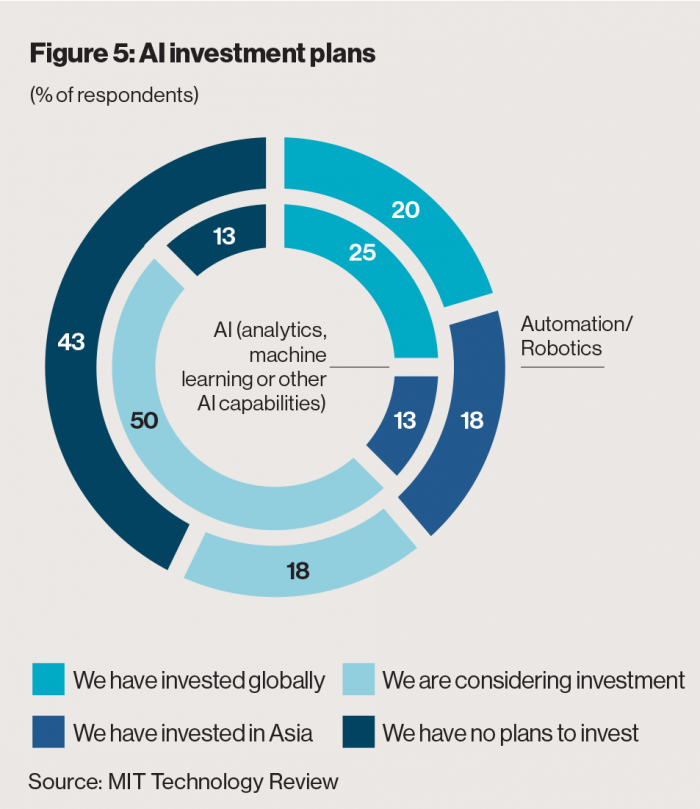Sponsored
Asia’s AI Agenda: Aware, but Unprepared?
in partnership withADP
Decision makers at Asian-based companies are firmly convinced of the benefits AI and automation technology will bring to their own prospects and the region’s economy as a whole, but most have not yet committed resources to capitalize on these beliefs.
A small percentage of respondents indicate that they have invested in AI in Asia, and nearly 20 percent say they have robotics and automation commitments in the region. Larger percentages indicate that they have AI or robotics investments at global levels, and fully half indicate that they are considering AI investments.
While multinational companies may not be committing resources to AI development in Asia yet, domestic industries across the region are most certainly doing so, driven by a traditional response of policy makers in the region, according to Tak Lo, a partner at Hong Kong-based AI accelerator Zeroth.AI. “The external shocks that can happen create risk that Asian governments feel they need to take to mitigate with technology progression,” he says.

In China, the hope is to use automation to bolster labor productivity as the country’s workforce ages and shrinks. Over the longer term, China hopes to build a domestic manufacturing capability in industrial robots and, by extension, in process automation and artificial intelligence. Singapore, by contrast “is into a little bit of everything—fintech [financial technology], autonomous driving, automated customer support,” Tak says.
Autonomous driving is considered one of the most likely AI-enabled applications, but largely as an anchor for establishing a broad-based AI innovation platform, says Zhang Yue of the Singapore University of Technology and Design. “Singapore is aligning its policy objectives across multiple sectors—urban mobility, financial data science, health care—in an effort to elicit the synergies across them and speed up AI development overall,” says Zhang, a professor and machine-language researcher.
Asia as a regional economy is poised not only to benefit greatly from advancements in AI and robotics technologies, but to also define them—and perhaps to lead their future development. AI’s rise will create a seismic shift in the processes that senior managers
use to manage talent, growth, and productivity across nearly every industry sector. Asian businesses stand to leverage AI’s rise faster, thanks to the virtuous cycle created by Asia’s technology investments and the organic growth of big data.
Keep Reading
Most Popular
Large language models can do jaw-dropping things. But nobody knows exactly why.
And that's a problem. Figuring it out is one of the biggest scientific puzzles of our time and a crucial step towards controlling more powerful future models.
How scientists traced a mysterious covid case back to six toilets
When wastewater surveillance turns into a hunt for a single infected individual, the ethics get tricky.
The problem with plug-in hybrids? Their drivers.
Plug-in hybrids are often sold as a transition to EVs, but new data from Europe shows we’re still underestimating the emissions they produce.
Google DeepMind’s new generative model makes Super Mario–like games from scratch
Genie learns how to control games by watching hours and hours of video. It could help train next-gen robots too.
Stay connected
Get the latest updates from
MIT Technology Review
Discover special offers, top stories, upcoming events, and more.